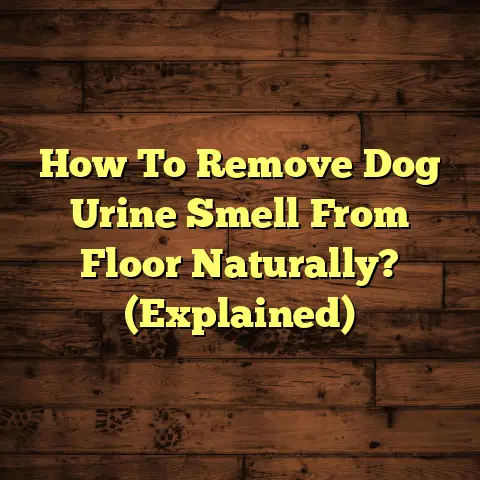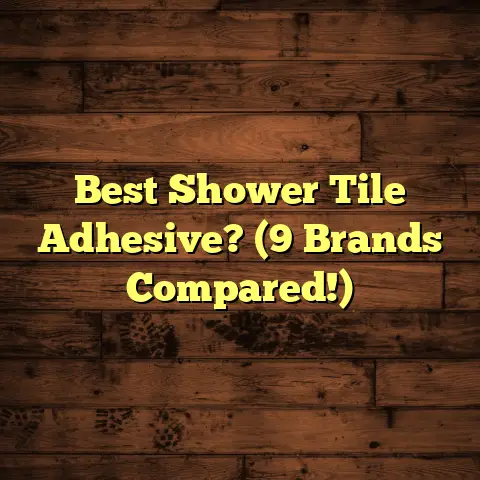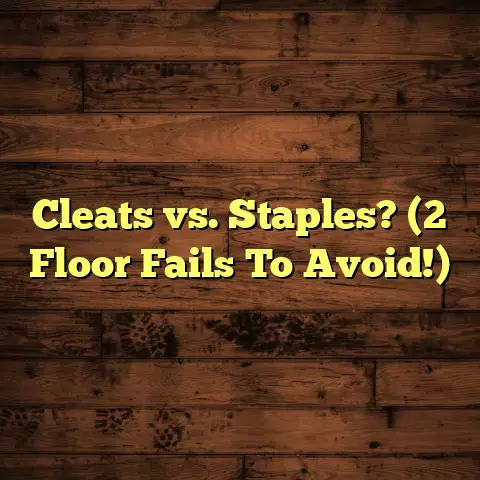Roomba on Hardwood: Worth it? (1 Top Scratch Risk!)
You know, it’s funny. Not long ago, the idea of a robot cleaning our homes felt like something straight out of The Jetsons. Now, everyone’s got one!
The demand for smart home devices is booming, and Roombas are leading the charge, promising us a life with less chore time. But as a flooring expert, I always get asked: Are Roombas safe for hardwood floors?
That’s what we’re diving into today. Let’s get started, shall we?
The Rise of Robotic Vacuums
Robotic vacuums have come a long way. I still remember when the first models hit the market. They were clunky, got stuck easily, and their cleaning power was… well, let’s just say it left something to be desired.
But look at them now! These little guys are packed with sensors, smart navigation, and some serious suction. They’ve become incredibly popular. Homeowners love the hands-off approach. I mean, who wouldn’t want to reclaim hours spent vacuuming?
The numbers don’t lie. According to Statista, the global robotic vacuum cleaner market is projected to reach over $15 billion by 2027. ^(Statista Robotic Vacuum Market)
That’s a huge jump, showing just how much we’ve embraced these automated helpers. The biggest advantages? Time-saving, the ability to schedule cleanings, and just plain convenience.
Understanding Hardwood Flooring
Now, let’s talk about hardwood. There’s a reason hardwood floors are so popular. They’re beautiful, add value to your home, and have a timeless appeal. I’ve installed countless hardwood floors. I can tell you that each type has its own unique characteristics.
You’ve got your classic oak, known for its durability and versatility. Then there’s maple, with its smooth, clean look. And don’t forget exotic options like Brazilian cherry or tigerwood, which bring a touch of luxury.
But here’s the thing: all hardwood floors, regardless of species, are susceptible to scratches and scuffs. The finish is the first line of defense. Whether it’s polyurethane, varnish, or oil-based, the finish protects the wood from everyday wear and tear.
But even the toughest finishes can be compromised. And once that happens, you’re looking at potential long-term damage, including discoloration, warping, and costly repairs.
Maintaining the integrity of your hardwood is key.
The Roomba’s Features and Specifications
Okay, let’s get down to the nitty-gritty of Roombas. What makes them tick, and what features should you be aware of when it comes to hardwood floors?
Most Roomba models come equipped with features like:
- Suction Power: This determines how well it picks up dirt and debris.
- Brush Design: Some have bristle brushes, while others use rubberized rollers.
- Mapping Technology: Allows the Roomba to navigate your home efficiently.
- Dirt Detection: Helps the Roomba focus on areas with more dirt.
Now, not all Roombas are created equal. Some models have stronger suction, which can be great for carpets but potentially harsher on hardwood. Others have softer brush designs that are gentler on delicate surfaces.
For example, the Roomba i7+ has advanced mapping and powerful suction. But the Roomba s9+ boasts a corner brush and a high-efficiency filter, which might be better for homes with pets.
Battery life is another factor to consider. You want a Roomba that can clean your entire floor without needing a recharge. Noise levels are important too, especially if you plan to run it while you’re home.
Pros of Using a Roomba on Hardwood Floors
Let’s talk about the good stuff. Using a Roomba on hardwood floors has some definite perks.
First and foremost, it’s easy. You just press a button (or schedule it through an app), and off it goes. No more lugging around a heavy vacuum cleaner!
It saves time, big time. Instead of spending your weekends vacuuming, you can focus on things you actually enjoy.
Roombas are surprisingly effective at handling pet hair and dust. If you have furry friends, you know how much they shed. A Roomba can help keep the fur at bay, preventing it from accumulating and scratching your floors.
I’ve seen many clients who rave about the convenience of scheduling cleanings. You can set it to run while you’re at work or asleep, so you always come home to a clean floor.
The Top Scratch Risk
Alright, here’s the part you’ve been waiting for. The elephant in the room: scratching. Can a Roomba scratch your hardwood floors? The short answer is yes, it can.
The primary culprit is the brush design. Many Roombas have bristle brushes that, while effective at picking up dirt, can also act like tiny sandpaper if not properly maintained.
Foreign debris is another major factor. Think about it: the Roomba is constantly rolling over your floors, picking up dirt, sand, and other particles. If these particles get trapped in the brushes or wheels, they can scratch the finish.
Even the Roomba’s navigation can play a role. If it bumps into furniture or walls repeatedly, it can cause scuff marks and scratches.
I’ve heard countless stories from homeowners who’ve experienced this firsthand. One client told me she noticed fine scratches on her newly refinished floors after using her Roomba for just a few weeks.
Another said her Roomba kept getting stuck on a rug, and the repeated spinning caused noticeable swirl marks on the surrounding hardwood.
Mitigating the Scratch Risk
So, what can you do to minimize the risk of scratching? I’ve got a few tips and tricks that I’ve learned over the years.
First, regular maintenance is key. Clean your Roomba’s brushes and wheels frequently to remove any trapped debris. You should also empty the dustbin regularly to prevent it from overflowing and scratching the floor.
Consider upgrading to softer brush types. Some Roomba models offer rubberized rollers or microfiber pads that are gentler on hardwood floors.
Another important tip: declutter your floors. The fewer obstacles the Roomba has to navigate, the less likely it is to bump into things and cause scratches.
I also recommend using area rugs in high-traffic areas. This will provide an extra layer of protection for your hardwood floors.
User Experiences and Reviews
Let’s take a look at what other Roomba users are saying about their experiences with hardwood floors.
I’ve scoured online forums, social media, and product review sites to get a balanced view.
Some users rave about how their Roombas have transformed their cleaning routines, keeping their hardwood floors spotless with minimal effort. They appreciate the convenience and the time savings.
However, others report experiencing scratches and scuff marks, especially on older or more delicate finishes. They feel that the convenience of the Roomba isn’t worth the risk of damaging their floors.
One user on Reddit wrote, “I love my Roomba, but I’ve definitely noticed some fine scratches on my hardwood floors. I try to run it less often now and sweep more regularly.”
Another user on Amazon commented, “I was so excited to get a Roomba, but I’m disappointed with how it’s affected my floors. I’ve switched back to using a regular vacuum.”
Conclusion
So, is a Roomba worth it for homeowners with hardwood floors? The answer, as with most things, is it depends.
Roombas offer undeniable cleaning benefits, saving you time and effort. They’re great for maintaining a consistent level of cleanliness, especially if you have pets or a busy lifestyle.
However, the risk of scratching is a serious consideration. If you have delicate hardwood floors or are particularly concerned about maintaining their pristine condition, you may want to think twice.
Ultimately, the decision is yours. Weigh the pros and cons carefully, consider your specific needs and concerns, and make an informed choice.
As for the future of robotic cleaning technology, I’m optimistic. I believe that manufacturers will continue to develop innovative solutions that are both effective and gentle on hardwood floors.
Who knows, maybe one day we’ll have Roombas that can polish our floors as they clean them!





